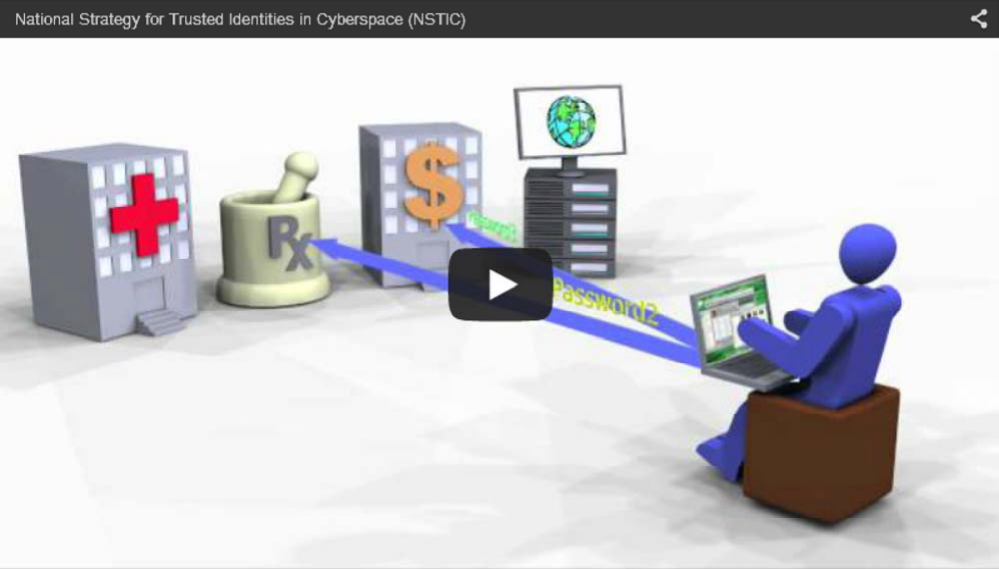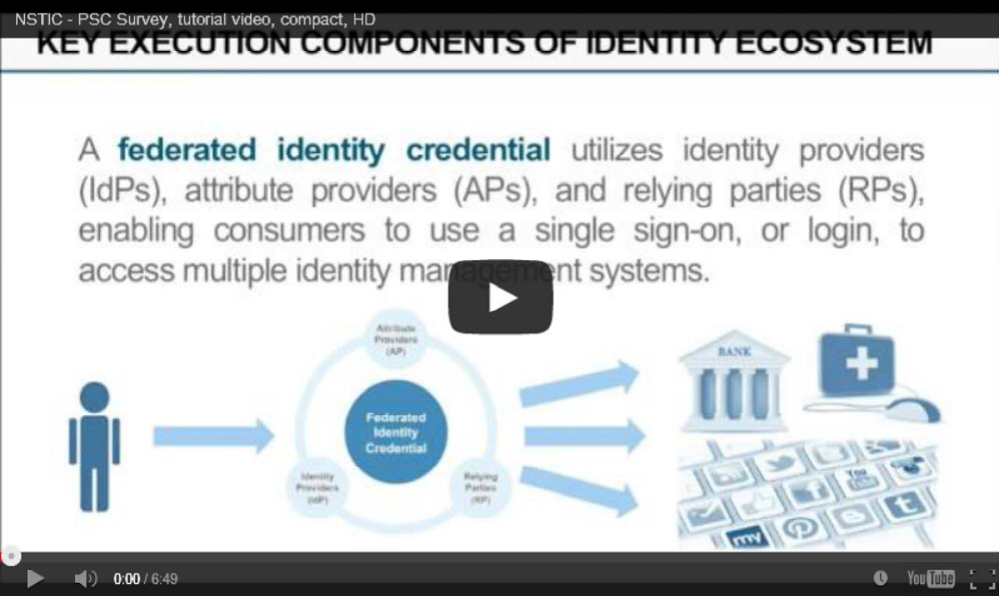Understanding the Barriers of Acquiring Relying Parties to NSTIC
Generic Clearance for the Collection of Qualitative Feedback on Agency Service Delivery
0690-0030-NSTIC-Instrument 5-1-15
Understanding the Barriers of Acquiring Relying Parties to NSTIC
OMB: 0690-0030
Online
Survey
Software
|
Qualtrics
Survey
Solutions
Page


OMB Control No. 0690-0030
Expiration Date: 06/30/2017
Understanding the barriers of acquiring relying parties to NSTIC
BACKGROUND
The National Strategy for Trusted Identities in Cyberspace (NSTIC) is a White House initiative signed by President Obama in 2011. The NSTIC envisions an Identity Ecosystem, where individuals and organizations utilize secure, efficient, easy-to-use, and interoperable identity credentials to access online services in a manner that promotes confidence, privacy, choice, and innovation. The Identity Ecosystem Steering Group (IDESG) is a private-sector led organization, funded by the NSTIC, that’s facilitating the development of the Identity Ecosystem.
PURPOSE OF THIS SURVEY
The Identity Ecosystem will be most successful if it has an abundance of Relying Parties (RPs) – organizations accepting 3rd party federated credentials from Service Providers for access to their services. Unfortunately, there is currently a dearth of organizations willing to act as RPs; this survey delves into this issue, seeking to further understand the barriers that prevent organizations from transitioning to this role.
WHY WE VALUE YOUR RESPONSE
As an existing or potential RP, your input is critical in helping the NSTIC National Program Office (NPO) identify and mitigate the barriers that currently prevent many organizations from accepting 3rd party credentials. The results of this survey will inform the work of the NPO in implementing the NSTIC, and will be particularly useful for the IDESG in establishing an Identity Ecosystem.
CONFIDENTIALITY STATEMENT
All responses - including any personal information - will be kept strictly confidential. No identifying information will be saved with survey data. All survey participant information - including contact persons and organization names - will be kept anonymous and will not
be shared with NPO or any external party.
If you have any additional questions, please contact us. Purdue Student Consulting
purduestudentconsulting@gmail.com
 National
Strategy for
Trusted
Identities in Cyberspace (NSTIC) Video:
National
Strategy for
Trusted
Identities in Cyberspace (NSTIC) Video:

NSTIC and the Identity Ecosystem:

 Low
awareness
of
3rd
party federated credentials among
Low
awareness
of
3rd
party federated credentials among
prevents 3rd party federated credentials from being adopted by my organization.
My organization
The public
Strongly
Disagree Disagree
Neither Agree nor
Disagree Agree
Strongly
Agree
I don't know
 Lack
of
understanding
of
3rd
party federated credentials among
Lack
of
understanding
of
3rd
party federated credentials among
prevents 3rd party federated credentials from being adopted by my organization.
My organization
The public
Strongly
Disagree Disagree
Neither Agree nor
Disagree Agree
Strongly
Agree
I don't know
 Low
awareness
of
the
Identity
Ecosystem among
prevents 3rd
Low
awareness
of
the
Identity
Ecosystem among
prevents 3rd
party federated credentials from being adopted by my organization.
My organization
The public
Strongly
Disagree Disagree
Neither Agree nor
Disagree Agree
Strongly
Agree
I don't know
 Lack
of
understanding
of
the
Identity
Ecosystem among
Lack
of
understanding
of
the
Identity
Ecosystem among
prevents 3rd party federated credentials from being adopted by my organization.
My organization
The public
Strongly
Disagree Disagree
Neither Agree nor
Disagree Agree
Strongly
Agree
I don't know
 I
think
is sufficiently
aware
of
the
security
risks
of
passwords.
I
think
is sufficiently
aware
of
the
security
risks
of
passwords.
My organization
Strongly
Disagree Disagree
Neither Agree nor
Disagree Agree
Strongly
Agree
I don't know
The public
Strongly
Disagree Disagree
Neither Agree nor
Disagree Agree
Strongly
Agree
I don't know
 I
think
is/are more
comfortable using passwords for
authentication
I
think
is/are more
comfortable using passwords for
authentication
than biometrics, PINs, other methods.
My organization
My customers
Strongly
Disagree Disagree
Neither Agree nor
Disagree Agree
Strongly
Agree
I don't know
 I
think
is/are more comfortable using my proprietary credentialing
I
think
is/are more comfortable using my proprietary credentialing
services rather than 3rd party federated credentials.
My organization
My customers
Strongly
Disagree Disagree
Neither Agree nor
Disagree Agree
Strongly
Agree
I don't know
 I
think
that
overall
my industry's
existing protection
measures
against
I
think
that
overall
my industry's
existing protection
measures
against
security breaches are sufficient.
Strongly Disagree
Disagree
Neither Agree nor Disagree
Agree
Strongly Agree
I don't know
Not applicable
 I
think
3rd
party
federated
credentials
will
make online
transactions
I
think
3rd
party
federated
credentials
will
make online
transactions
between my organization and customers more secure.
Strongly Disagree
Disagree
Neither Agree nor Disagree
Agree
Strongly Agree
I don't know
Not applicable
 I
think
my customers would prefer to
use
3rd party federated credentials which
I
think
my customers would prefer to
use
3rd party federated credentials which
enhance privacy, if given the opportunity and educational information.
Strongly Disagree
Disagree
Neither Agree nor Disagree
Agree
Strongly Agree
I don't know
Not applicable
 I
think
my customers would prefer to
use
3rd party federated credentials which can be used
conveniently
in
multiple
places,
if
given the opportunity and
I
think
my customers would prefer to
use
3rd party federated credentials which can be used
conveniently
in
multiple
places,
if
given the opportunity and
educational information.
Strongly Disagree
Disagree
Neither Agree nor Disagree
Agree
Strongly Agree
I don't know
Not applicable
 Less
control
over
collecting
consumer
data
resulting
from using 3rd party credential providers prevents my organization
from adopting 3rd party
Less
control
over
collecting
consumer
data
resulting
from using 3rd party credential providers prevents my organization
from adopting 3rd party
federated credentials.
Strongly Disagree
Disagree
Neither Agree nor Disagree
Agree
Strongly Agree
I don't know
Not applicable
 Less
control
over
user
experience
resulting
from using 3rd party credential providers prevents my organization
from adopting 3rd party federated
Less
control
over
user
experience
resulting
from using 3rd party credential providers prevents my organization
from adopting 3rd party federated
credentials.
Strongly Disagree
Disagree
Neither Agree nor Disagree
Agree
Strongly Agree I don't know Not applicable
 Current
security
authentication
standards
(username
/
password)
are
perceived sufficient
enough
by
that
it
questions the necessity of
Current
security
authentication
standards
(username
/
password)
are
perceived sufficient
enough
by
that
it
questions the necessity of
3rd party federated credentials.
My organization
My customers
Strongly
Disagree Disagree
Neither Agree nor
Disagree Agree
Strongly
Agree
I don't know
Not applicable
 Concerns
over
loss
of
customers
due
to
requiring
3rd
party
federated
credentials
prevents
my organization from
adopting
3rd party federated
Concerns
over
loss
of
customers
due
to
requiring
3rd
party
federated
credentials
prevents
my organization from
adopting
3rd party federated
credentials.
Strongly Disagree
Disagree
Neither Agree nor Disagree
Agree
Strongly Agree
I don't know
Not applicable
 Concerns
over
increased
ease for
customers
to
move
to
competitors
Concerns
over
increased
ease for
customers
to
move
to
competitors
prevents my organization from adopting 3rd party federated credentials.
Strongly Disagree
Disagree
Neither Agree nor Disagree
Agree
Strongly Agree
I don't know
Not applicable
 It
is
important to
that
the
rules and policies of
the
Identity
It
is
important to
that
the
rules and policies of
the
Identity
Ecosystem are being developed by the private sector.
My organization
The public
Strongly
Disagree Disagree
Neither Agree nor
Disagree Agree
Strongly
Agree
I don't know
 Lack
of
clear
financial
benefits
prevents
my organization
from adopting 3rd
Lack
of
clear
financial
benefits
prevents
my organization
from adopting 3rd
party federated credentials.
Strongly Disagree
Disagree
Neither Agree nor Disagree
Agree
Strongly Agree
I don't know
Not applicable
 My
organization has
over unclear
liabilities
in
the case of
My
organization has
over unclear
liabilities
in
the case of
security breaches if adopting 3rd party federated credentials.
No concerns Minor concerns Strong concerns
Very strong concerns
"I don't know" "Not applicable"
 My
organization has
that
3rd
party federated
credentials may not
My
organization has
that
3rd
party federated
credentials may not
support compliance to regulations applicable to my industry.
No concerns Minor concerns Strong concerns
Very strong concerns
"I don't know" "Not applicable"
 My
organization has
that
3rd
party federated
credentials
would
My
organization has
that
3rd
party federated
credentials
would
require more compliance reviews.
No concerns Minor concerns Strong concerns
Very strong concerns
"I don't know" "Not applicable"
 My
organization has
that
acceptance
of
3rd
party federated
My
organization has
that
acceptance
of
3rd
party federated
credentials will erode my organization's brand image.
No concerns Minor concerns Strong concerns
Very strong concerns
"I don't know" "Not applicable"
 Are
you a current member of
the
IDESG?
Are
you a current member of
the
IDESG?
Yes
No
 What
is
the
activity
/
sector
of
your
organization? (Multiple entries possible)
What
is
the
activity
/
sector
of
your
organization? (Multiple entries possible)
Financial
Services
Textile Environment Tourism/Travel
Transportation Health High-tech Insurance
Biotechnology Consulting Construction Internet

 Manufacturing Electronics Government Other,
please
describe
Manufacturing Electronics Government Other,
please
describe
 Please
list any other barriers which prevent
your organization from adopting
Please
list any other barriers which prevent
your organization from adopting

 3rd
party federated credentials
and explain their significance
in your opinion.
3rd
party federated credentials
and explain their significance
in your opinion.
 Please
let us know of
any
questions or comments you might have.
Please
let us know of
any
questions or comments you might have.



 You
have
reached
the
end
of
the
survey.
Thank
you
for
your
participation!
You
have
reached
the
end
of
the
survey.
Thank
you
for
your
participation!
NOTWITHSTANDING STATEMENT
This collection of information contains Paperwork Reduction Act (PRA) requirements approved by the Office of Management and Budget (OMB). Notwithstanding any other provision of the law, no person is required to respond to, nor shall any person be subject to a penalty for failure to comply with, a collection of information subject to the requirements of the PRA unless that collection of information displays a currently valid OMB control number. Public reporting burden for this collection is estimated to be 30 minutes per response, including the time for reviewing instructions, searching existing
data sources, gathering and maintaining the data needed and completing and reviewing
the collection of information.
>>
Powered by Qualtrics
https://purdue.qualtrics.com/SE/?SID=SV_8Gn43k8gFMJ2XXf&Preview=Survey&BrandI...
4/8/2015

| File Type | application/vnd.openxmlformats-officedocument.wordprocessingml.document |
| File Modified | 0000-00-00 |
| File Created | 0000-00-00 |
© 2026 OMB.report | Privacy Policy